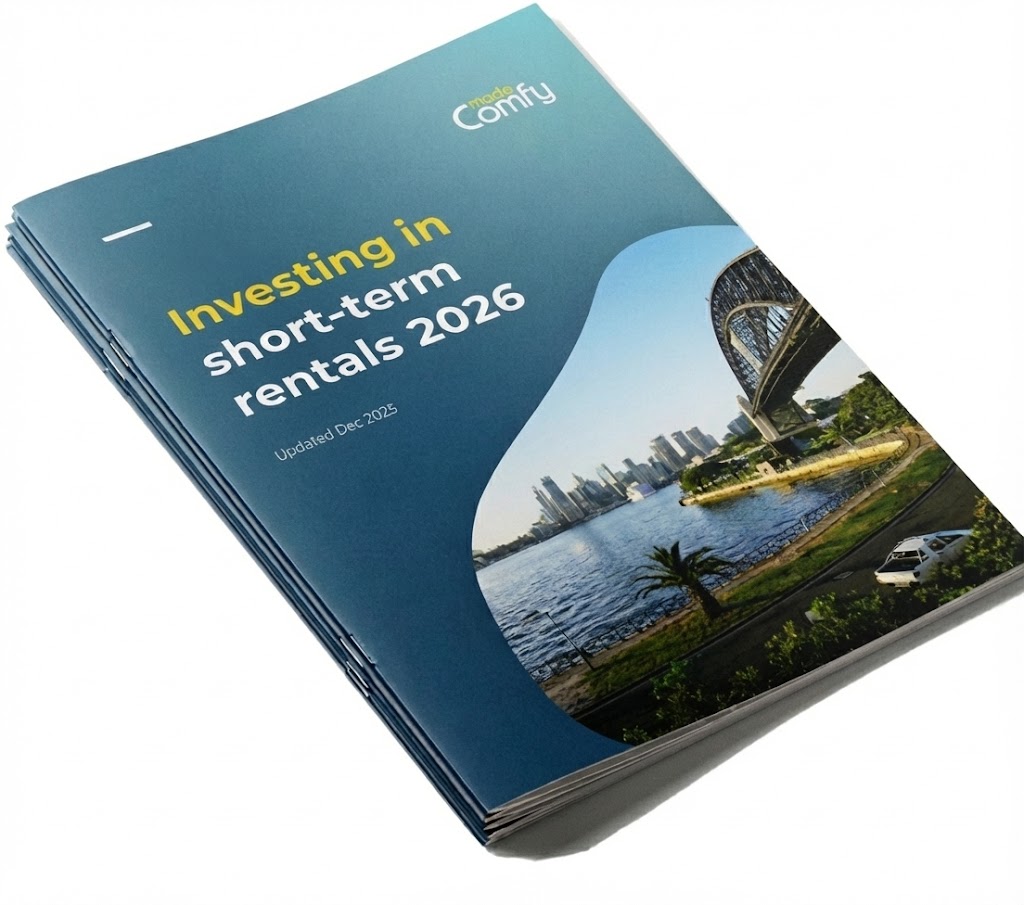Airbnb's New Super Guest Program: What ANZ's Airbnb Investors Need to Know

Airbnb just introduced “Super Guests." Again but this time it's set to raise the standard of the platform even further.
The short-term rental landscape is evolving, and Airbnb's introduction of the Super Guest program marks a significant shift in how the platform operates. For property investors and hosts across Australia and New Zealand, this development represents both an opportunity and a strategic consideration that could impact booking quality, occupancy rates, and overall investment returns.
While Airbnb has long rewarded top-performing hosts through its Superhost program, the platform is now turning its attention to the other side of the equation: recognising and incentivising high-quality guests. For investors managing properties in markets like Sydney, where occupancy rates average 65% with annual revenues of AU$77,619, or Melbourne, generating AU$54,975 annually with 67%-74% occupancy, understanding how guest ratings will influence your property is crucial.
Understanding the Super Guest Program
Airbnb originally announced plans for a guest membership program called "Superguest" back in 2020, with an initial trial launch to 10,000 guests. The concept mirrors the successful Superhost model but applies it to travellers, creating a tiered system that recognises guests who consistently demonstrate excellent behaviour, communication, and respect for property rules.
The program is designed to identify and reward guests based on their booking history, reviews from previous hosts, and overall reliability on the platform. While Airbnb already allows hosts to review guests across categories like cleanliness, house rules, and communication, the Super Guest designation formalises these metrics into a visible loyalty tier with tangible benefits.
For guests who achieve Super Guest status, potential perks may include booking discounts, priority access to listings, travel credits, and enhanced customer support—similar to loyalty programs offered by traditional hotel chains.
How Guest Ratings Currently Work on Airbnb
To appreciate the significance of the Super Guest program, it's essential to understand how Airbnb's existing guest rating system functions. After each stay, hosts rate their guests on a five-star scale across several categories:
- Cleanliness: How well guests maintained the property during their stay
- Communication: Responsiveness and clarity in messaging
- House Rules: Adherence to property-specific guidelines
These individual category ratings combine to create an overall guest rating, which other hosts can view when considering booking requests. Currently, these reviews serve as a basic vetting mechanism, but they lack the structured recognition and incentive framework that the Super Guest program promises to deliver.
Importantly, hosts can only see a guest's ratings after they've made a booking request or reservation. Guests with positive ratings (4-5 stars) display a checkmark next to those categories, while those with negative ratings (1-3 stars) show a warning icon.
What Super Guest Means for Property Owners and Investors
For Australian and New Zealand property investors, the Super Guest program introduces several strategic advantages that could significantly impact you short-term rental. Super Guest is basically a reputation layer for guests who:• book consistently• cancel less• follow house rules• leave strong reviews• and generally behave like the type of travelers every host wants.
Enhanced Guest Quality and Risk Mitigation
One of the most compelling benefits is the improved ability to identify low-risk, reliable guests. In markets where property damage, unauthorised parties, and fraudulent bookings pose ongoing concerns, Super Guests provide a clearer signal of trustworthiness. This is particularly valuable in high-value markets like the Whitsundays, where properties generate average annual revenues of AU$135,890, or Auckland's Albert-Eden district, earning NZ$14,689 annually.
Professional guest screening has become increasingly important, with platforms like MadeComfy implementing machine learning technology to flag dangerous reservations and conduct thorough ID verification. Super Guest status adds another layer of assurance, essentially pre-screening guests based on their proven track record across multiple stays.
Reduced Property Damage and Disputes
Hosting Super Guests can lead to fewer incidents of property damage, lower insurance claims, and reduced disputes. These guests have demonstrated consistent respect for property rules and cleanliness standards across multiple bookings, making them statistically less likely to cause problems.
For property managers handling multiple listings - common in markets like Perth, where the Airbnb market includes 5,598 active listings with an impressive 85% occupancy rate—minimising damage and disputes translates directly to lower operational costs and improved profitability.
Improved Review Quality and Algorithmic Performance
Super Guests tend to leave more detailed, positive reviews, which are critical for search ranking on Airbnb's platform. Listings with higher ratings appear more prominently in search results, and Airbnb explicitly prioritises recent reviews.
In competitive markets like Sydney, where 13,326 listings compete for visibility, or Melbourne's 20,704 active properties, maintaining a strong review profile is essential. Super Guests who consistently provide quality feedback help boost your listing's algorithmic performance, leading to increased visibility and more bookings.
Higher Occupancy Rates and Revenue Potential
Properties that attract Super Guests may experience improved occupancy rates and the ability to command premium nightly rates. Just as Superhost status increases booking conversion by building trust with potential guests, aligning your property with high-quality travellers creates a virtuous cycle of positive reviews and increased demand.
Research shows that Superhosts can earn up to 64% more than regular hosts, largely due to increased visibility and guest trust. Similarly, properties that consistently host Super Guests may develop a reputation for quality that attracts more discerning, higher-spending travellers.
Strategic Implications for Australian and New Zealand Investors
Adapting Your Listing Strategy
To attract Super Guests, property investors should optimise their listings to appeal to this demographic. This includes:
Professional Presentation: High-quality photos, accurate descriptions, and transparent house rules that set clear expectations
Competitive Pricing: While Super Guests may be willing to pay premium rates for quality properties, strategic pricing that balances value with profitability remains essential
Instant Booking: Super Guests may prefer the convenience of instant booking rather than waiting for host approval, a feature that frequent, trusted travellers particularly value
Clear Communication: Fast response times and detailed property information align with the expectations of experienced Airbnb users
Leveraging Guest Quality for Superhost Status
The relationship between Super Guests and Superhost status is complementary. To achieve and maintain Superhost status, Australian hosts must:
- Host at least 10 completed stays (or 3 long-term reservations totaling 100 nights) in the past year
- Maintain a 4.8 or higher average rating
- Respond to 90% of guest messages within 24 hours
- Keep cancellation rates below 1%
Hosting Super Guests makes achieving these benchmarks significantly easier. Their consistent positive behaviour and quality reviews help maintain the high ratings necessary for Superhost status, which in turn provides priority placement in search results, increased bookings, and potential earnings increases of 60% or more.
For investors in markets like Adelaide, where properties average AU$62,450 annually with 70% occupancy, or Brisbane's market generating AU$63,966 per year, the combination of Super Guest clientele and Superhost status can meaningfully improve investment returns.
Market-Specific Considerations
Different Australian and New Zealand markets present varying opportunities for leveraging the Super Guest program:
Tourism Hotspots: In destinations like the Gold Coast (AU$94,118 average annual revenue, 79% occupancy) or Queensland's Sunshine Coast (AU$96,509 annually), Super Guests represent frequent travellers who book high-quality accommodation for leisure purposes.
Metropolitan Markets: Sydney and Melbourne attract both business and leisure travellers. Super Guests in these markets often seek reliable, well-maintained properties for repeat visits, making them ideal for building a base of returning clientele.
Regional Investment Properties: In emerging markets or regional areas, Super Guests can help establish your property's reputation more quickly through quality early reviews, which is particularly valuable when entering less saturated markets.
Navigating Regulatory Environments
It's worth noting that regulatory landscapes vary significantly across Australia and New Zealand. Sydney operates under strict regulations with a 180-day cap on non-hosted stays, while Melbourne maintains a more lenient environment. Perth has strict regulations but still achieves high occupancy rates of 85%.
Super Guests, being experienced platform users, tend to be more understanding of regulatory requirements and property-specific rules. This makes them particularly valuable in jurisdictions with complex compliance requirements.
Investment Performance and Market Outlook
The Australian short-term rental market has demonstrated robust performance, with Airbnb contributing AU$20 billion to the nation's GDP and generating significant economic activity. Despite increasing regulatory scrutiny in some markets, demand for quality short-term accommodation remains strong.
For investors, the key metrics demonstrate healthy market fundamentals:
- Sydney: 65% occupancy, AU$332 average daily rate, AU$77,619 annual revenue
- Melbourne: 67% occupancy, AU$224 average daily rate, AU$54,975 annual revenue
- Perth: 85% occupancy, AU$212 average daily rate, AU$67,325 annual revenue
- Gold Coast: 79% occupancy, AU$320 average daily rate, AU$94,118 annual revenue
The introduction of the Super Guest program arrives as the market matures, with investors increasingly focused on quality over quantity. Rising insurance premiums, management overheads, and vacancy risks have prompted many owners to reconsider their strategies, making guest quality more important than ever.
Guest Screening and Risk Management
While the Super Guest program provides valuable signals about guest quality, professional property managers should continue to implement comprehensive screening practices. MadeComfy's approach, which employs machine learning to scan guests and flag risky reservations while conducting thorough ID verification, represents industry best practice.
Effective guest screening includes:
- Identity Verification: Confirming government-issued ID matches booking information
- Review History Analysis: Examining ratings and written reviews from previous hosts
- Communication Assessment: Evaluating guest messages for red flags or concerning language
- Booking Pattern Review: Identifying unusual booking characteristics that may indicate parties or misuse
- Automated Risk Scoring: Using AI-powered tools to assess risk levels systematically
Super Guest status should complement, not replace, these screening measures, providing an additional data point in your risk assessment framework.
Maximising Returns with the Super Guest Program
To capitalise on the Super Guest program, Australian and New Zealand property investors should consider the following strategic approaches:
Prioritise Guest Experience
Super Guests have earned their status by being excellent guests themselves, and they expect a commensurate level of hosting quality. Invest in property amenities, cleanliness, and communication that meet or exceed expectations.
Build Repeat Guest Relationships
Encourage Super Guests to return by offering loyalty incentives, such as discounts for repeat bookings or personalised touches that acknowledge their previous stays. Building a base of returning high-quality guests stabilises occupancy and reduces marketing costs.
Optimise for Search Visibility
Maintain the high standards required for Superhost status, as the combination of hosting Super Guests and holding Superhost designation creates maximum visibility in Airbnb's search algorithm. This is particularly crucial in competitive markets with thousands of active listings.
Leverage Professional Management
For investors with multiple properties or those seeking passive income, professional property management services like MadeComfy offer expertise in guest screening, communication, and optimisation strategies that maximise the benefits of the Super Guest program.
The Future of Short-Term Rental Investment
The Super Guest program signals Airbnb's evolution toward a more mature, quality-focused marketplace. For property investors in Australia and New Zealand, this shift aligns with broader market trends favouring professional management, regulatory compliance, and guest experience optimisation.
As the platform increasingly rewards both quality hosts and quality guests, investors who adapt their strategies accordingly will be best positioned to achieve strong returns. The data demonstrates that well-managed properties in prime locations continue to generate attractive yields, with some markets achieving rental yields exceeding 12% and rent gaps between short-term and long-term rentals of up to 738% in select locations.
However, success requires more than simply listing a property and waiting for bookings. The most profitable investors understand their local market dynamics, implement rigorous guest screening, maintain properties to high standards, and continuously optimise pricing and availability strategies.
Conclusion
Airbnb's Super Guest program represents a significant evolution in the short-term rental ecosystem, creating a formal recognition system for high-quality travellers. For Australian and New Zealand property investors, this development offers clear advantages: reduced risk, higher-quality reviews, improved occupancy rates, and the potential for premium pricing.
By understanding how guest ratings work, optimising listings to attract Super Guests, and maintaining the standards necessary for Superhost status, investors can position their properties for sustained success in an increasingly competitive market. Combined with professional management practices and comprehensive guest screening, the Super Guest program becomes a valuable tool in building a profitable, low-risk short-term rental portfolio.
As the short-term rental market continues to mature, those who prioritise guest quality alongside property quality will find themselves at a distinct advantage - with better reviews, higher occupancy, and ultimately, stronger investment returns across Australia and New Zealand's dynamic accommodation markets.


























